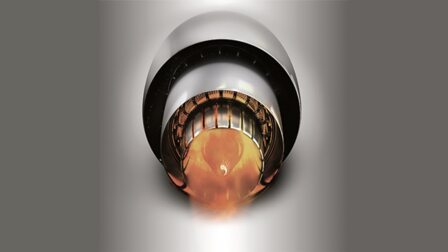In the Gas Turbine Combustion Chamber fuel burns at temperatures of 2000 °C (3630 °F) and more. And that figure is constantly rising, because turbine manufacturers rely on ever higher turbine inlet temperatures to improve efficiency. Oerlikon Metco’s specialists not only have the knowledge about the materials that protect the critical turbine parts, but also have a high degree of technical knowledge to support the thermal spray process used to apply them.
Hotter Than Ever!
Even though many parts in the gas turbine utilize air cooling to improve temperature resistance, the metal parts in the combustion chamber of an aerospace turbine have to withstand temperatures up to 1300 °C (2370 °F). Thermal sprayed MCrAlY bond coats and Yttria-Stabilized Zirconia (YSZ) topcoats from Oerlikon Metco protect critical turbine parts from excessive heat and allow operational temperatures that would otherwise not be possible.
More Than Material Knowledge
Still, engine operating temperatures continue to increase, and the industry demands new and advanced thermal barrier coating (TBC) systems to protect engine components. Working closely with original equipment manufacturers (OEMs), Oerlikon Metco’s team of material scientists, engineers and application specialists are researching and developing advanced TBC technologies to satisfy the growing technical demand of the industry. A few such development targets include improved bond coat compositions, TBC top coats with advanced compositions that further lower thermal conductivity, CMAS*-resistant thermal barrier topcoats as well as overall advancements to thermal spray processes and processing capabilities.
The primary objective is to maximize performance at lower application cost. Therefore, the Oerlikon Metco team not only look at the material, but also the process of thermal spraying, and the interaction of gun selection and spray parameter optimization. This integrated approach, along with the material selection, results in robust and reliable coating performance — a factor especially critical for new TBC systems that have complex multi-layer design requirements.
Approved and Certified
Oerlikon Metco’s TBC systems enable higher combustion temperatures permitting better fuel and engine efficiency, improved performance, increased safety and a longer life cycle.
- Faster processing time reduces labor and utility costs;
- Part turn time is reduced, and thermal spray cell production throughput is increased;
- Improved coating consistency reduces the risk for rework;
- Improved part-to-part consistency improves mission reliability.
Our thermal barrier materials and bond coats are approved and certified to key engine manufacturers and applied not only by OEMs, but also utilized by certified applicators for MRO (maintenance, repair and overhaul).
*CMAS = Calcium Magnesium Aluminum Silicate (sand) that gets ingested in the engine, melts and solidifies on the TBC causing coating problems.

